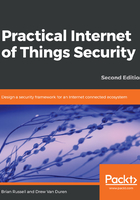
A Brave New World
While any new generation prides itself on the technological advancements it enjoys compared to its forebears, it is not uncommon for each to dismiss or simply not acknowledge the enormity of thought, innovation, collaboration, competition, and connections throughout history that made, say, smartphones or unmanned aircraft possible. The reality is that, while previous generations may not have enjoyed the realizations in gadgetry we have today, they most certainly did envision them. Science fiction has always served as a frighteningly predictive medium, whether it's Arthur C. Clarke envisioning Earth-orbiting satellites or E.E. Doc Smith's classic sci-fi stories melding the universe of thought and action together (reminiscent of today's phenomenal, new brain-machine interfaces).
While the term Internet of Things (IoT) is new, the ideas of today's and tomorrow's IoT are not. Consider one of the greatest engineering pioneers, Nikola Tesla, who, in a 1926 interview with Colliers magazine, said the following:
Source: http://www.tfcbooks.com/tesla/1926-01-30.htm
In 1950, the British scientist, Alan Turing, stated the following:
(Source: "Computing Machinery and Intelligence." Mind 49: 433-460.)
No doubt, the incredible advancements in digital processing, communications, manufacturing, sensors, and control are bringing to life the realistic imaginings of both our current generation and our forebears. Such advancements provide us with a powerful example of the very ecosystem of the thoughts, needs, and wants that drive us to build the new tools and solutions that we want for enjoyment and need for survival.
We must counterbalance all of our dreamy, hopeful thoughts about humanity's future by the fact that human consciousness and behavior always has, and always will, fall short of Utopian ideals. There will always be overt and concealed criminal activity; there will always be otherwise decent citizens who find themselves entangled in plots, financial messes, and blackmail; there will always be accidents; there will always be profiteers and scammers willing to hurt and benefit from the misery of others. In short, there will always be some individuals motivated to break in and compromise devices and systems for the same reason a burglar breaks into your house to steal your most prized possessions. Your loss is their gain. Worse, with the IoT, the motivation may extend to imposing physical injury or even death. A keystroke today can save a human life when properly configuring a pacemaker; it can also disable your car's braking system or hobble an Iranian nuclear research facility.
IoT security is clearly important, but before we can delve into the practical aspects of IoT security, we will take a look at the following:
- Defining the IoT
- Cybersecurity versus IoT security
- The IoT of today
- The IoT ecosystem
- The IoT of tomorrow